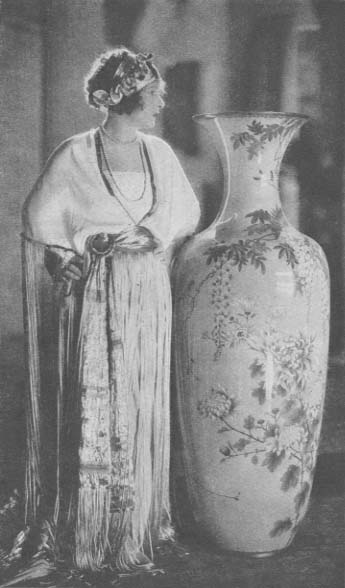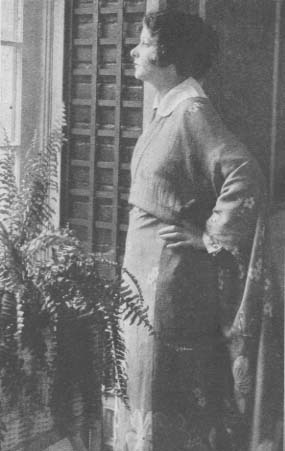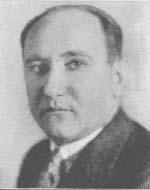

From Photoplay, August 1923, p. 38-39+
The moment you start to write about Norma Talmadge you are affected by her own viewpoint about herself.
 |
|
| Norma Talmadge embodies the rare perfection and polish and beauty of a vase--the vase of the Chinese legend which was so adored by the young Prince that it was miraculously changed into a lovely, living woman. |
A "nothing-to-get-excited-about-be-yourself-we're-all-human" sort of viewpoint that forces you into a position of telling the truth, the whole truth, and nothing but the truth.
Charlie Chaplin has an interesting theory that the development of an ego is necessary to the development of an artistic career--both as a protective measure (like a porcupine's quills) and a mental cocktail.
Maybe so.
But if he's right, I don't see how Norma Talmadge has risen to such artistic heights.
In all my life I have never met a person with so little ego.
There is no method in the world by which you can force Norma Talmadge into the center of any gathering. No amount of scheming will make her occupy the spotlight. There is no way in which you can make her assume that she is the important person in any conversation.
Just can't be done, that's all.
Not that she is shy and retiring. Far, oh very far, from it. But she's just "one of us"--whether there are fifty people in the room or two. And the idea of "The Great Norma Talmadge" elevated on a pedestal and delivering opinions tickles her sense of humor so that it's impossible for her, splendid actress as she is, to get away with it.
There is no question of Norma's position upon the screen. She holds her place as one of the leading dramatic actresses of the silversheet against foreign invasion, new discoveries and every effort to unseat her.
Mary Pickford and Norma Talmadge. The great development of the motion picture, the millions of dollars thrown into its market, the spread of its appeal, have no effect upon these favorites.
And it is doubly remarkable in that I have never known two women so utterly, completely different in every way.
Mary awakens your love.
 |
|
| Above, the star who at home is Mrs. Joseph Schenck. |
Norma awakens your admiration.
Mary makes you long to be of service to her.
Norma makes you long to have her friendship.
Mary shrinks from life--from its ugliness, its crowds, its joys and sorrows and depths. The staring throngs make her unhappy and shy. She loves the life of a recluse, devoted to her work, surrounded by a few very close, beloved friends.
Norma loves life--down to the last drop in the cup. Her hands reach out for more of it without fear or favor. She is vitally interested in people. The staring throngs bother her not at all--either she doesn't see them, or she stares back. She adores parties and lights and gaiety and excitement and people--oh, lots of people, with new ideas and new emotions and new faces.
Mary Pickford is some sort of divine child, who always seems far away from you, glowing in a backlight, filled with a genius she herself hardly understands. Norma Talmadge is an intelligent, brilliant woman of the world, with every faculty keyed to the highest pitch, constantly animated by keen sense of humor and a restless eagerness.
Mary's work is her life.
Norma's work is her profession.
I like to call Norma "The Lady of the Vase."
There is an old Chinese legend, which I discovered in a dust-encrusted volume while I was poking about an old book store one day, which tells a tale concerning a young Prince who owned a beautiful vase, the most perfect vase in all China.
Now, says the story, the handsome young Prince loved this vase more than all his possessions. None of the other priceless treasures which filled his palace won from him more than a passing glance.
And because he was a wise and good Prince, who had served his people faithfully, the gods rewarded him. One day, as he sat gazing at his vase, its form changed and, behold, there stepped down from the pedestal a living, breathing woman, who embodied all the rare perfection and polish and beauty of his vase.
The Lady of the Vase had come to life, as Galatea came to life for Pygmalion, and she and the Prince were married and lived happily ever after.
Whenever I think of the Lady of the Vase, I always think of Norma Talmadge. Often, when I see a cloisonne vase that is particularly lovely, it reminds me of Norma. I can think of no other way to describe to you that colorful, aloof, polished charm of hers.
I have met but three absolutely natural women in my life.
One was a Duchess with whom I happened to cross the North Sea in a very rough gale on a very small steamer which seemed determined, between them, to land us all in a watery grave.
One was a lady in jail for shooting a couple of her husbands.
The other is Norma Talmadge.
Marie Antionette in the gardens of petite Trianon.
(By the way, I should like to see her play Marie Antoinette, sometime--and Portia.)
And there is something in Norma's character that makes me perfectly sure that she would walk up the steps of the guillotine as daintily and as indifferently as any 18th century marquise.
It never makes any different where you find Norma--at the Sixty Club, in the swimming pool, on location, on the set. Her manner never varies a fraction.
I saw her the other morning shopping on Hollywood Boulevard, her hair flying, her nose powderless, her slenderness accentuated by a straight pink and white apron. She was having the best time and she had forgotten everybody and everything--most of all Norma Talmadge.
She never admits her identity if she can help it. One day in a theater lobby a group of girls dashed up and said, "Oh, you are Norma Talmadge, aren't you?" Norma opened surprised eyes, pulled her hat over her ears and said, "My gracious, no! Is she around here?"
It isn't upstage. It's a form of bashfulness. She will not be gushed over and she finds it hard to accept her fame and the adulation that goes with it.
 |
|
| At the left, her husband, one of the wealthiest and shrewdest of producers, who relieves her of every detail of worry and strife about her pictures. Theirs is one of the happiest marriages in all film records. |
Norma originated "cat parties" in Hollywood. Of course you know what cat parties are. Soirees for ladies only. Female smokers.
And the most entertained--and very often the most silent--person in the room is usually Norma Talmadge. She gets a tremendous vicarious kick out of other women's experiences. Her eyes are eager, interested, and her active, alert brain absorbs everything like a sponge. The whys and the wherefores of what women do intrigue her intensely.
I suppose, later, we reap the benefit of that on the screen.
She is the best listener--the most inspiring listener--I have ever encountered. It doesn't matter whether the subject is psychic phenomena or poached eggs. But she can be gorgeously, aristocratically rude when you try to make her the subject of conversation. It isn't because she's unwilling for you to know about her, it's just that it bores her horribly.
[Photo omitted: A mob of people. Caption: England as well as America acknowledges Norma as queen. When she visited London the reception at Victoria station was equal to any accorded royalty]
It's one of the most bewhiskered of adages that a man is known by his friends.
Norma's are particularly interesting as a criterion of her character.
The much loved wife of a producer--a woman with three children and a deep and beautiful outlook on life--a woman of tremendous efficiency. A brilliant woman critic, whose house on a hilltop is a gathering place of intellectuals. A famous scenario writer, almost as well known for her wit and frankness as for her ability. The widow of a famous screen star, who stands in Hollywood for everything that is fine and worth while in womanhood. A girl who has had a rotten bad break from life, but who manages to smile anyway.
There is one characteristic that is common to every woman with whom I have ever seen Norma friendly--a characteristic, too, that isn't common to the feminine sex--a sense of humor.
Her home is extremely beautiful and it expresses more of her personality than the homes of most stars. One thing, too I remarked about it. Most women screen stars fill their homes. If there happens to be a husband, he does the best he can. It is her boudoir, her dressing room, her sleeping porch, her breakfast nook, her this and her that. In Norma's home, everything seems to be arranged chiefly for her husband and his comfort.
And it is plain that this is her desire.
Norma's marriage to Joe Schenck is one of the happiest in the film industry.
In fact, Norma seems to have been born under a lucky star.
I don't suppose there is a woman in the world today upon whom gifts have been so profusely showered. Her gowns, her jewels, her furs, her art treasures, her cars--literally, she has everything. She doesn't know what it is to desire anything. She has never had a business worry in her career. Her husband is one of the richest and shrewdest producers in the game, and every smallest detail of worry or strife about her pictures is taken off her shoulders.
I think that she has come to have a great indifference for all the things that money buys. She is surfeited with material luxury. I can imagine her mislaying a fifty thousand dollar string of pearls.
Her indifference--almost insolence--concerning the loveliness that surrounds her is only the stuffed appetite of a child who has had too many sweets. And she has not allowed it to dominate her--she has shrugged it aside, instead of allowing it to bury her and stifle her development. It seems to have created a great desire for intellectual things, for human things, things that money cannot buy.
And she loves to remember the days when she ran all the way home from the Vitagraph studio, weeping with joy, and dragging behind her a sixteen-pound Christmas turkey that had been presented to her at the studio. She likes to tell you about the days when she started in pictures--at thirteen--and earned $25 a week and could help her mother bear the burden of supporting the family of three small daughters. And her eyes grow dreamy when she recalls a certain flat in New York that they wanted very much, but it was $65 a month, and she and Connie only earned $60 between them, and their mother had told them they must never pay more a month in rent than they earned in a week. Her climb up the ladder--to Griffith--then to stardom with Selznick--then to her own company with her husband backing her--she gets a great thrill out of remembering it all.
She has one point in common with Mary Pickford.
Her worship of her mother. Her eyes fill with tears of love and gratitude when she speaks of her. "When I think," she said to me the other day, "of all my mother did for us! How she managed to keep things nice and cook good dinners out of nothing on a one-burner gas stove--and never let us know we were poor. She's the most wonderful woman in the world."
She has, too, a strong sense of family devotion--to her sister Connie, and Natalie Talmadge Keaton--and young Joseph Talmadge Keaton.
Altogether, Norma Talmadge is an extremely real, extremely human and unspoiled girl and I like her and so would you.
Last revised, June 28, 2002